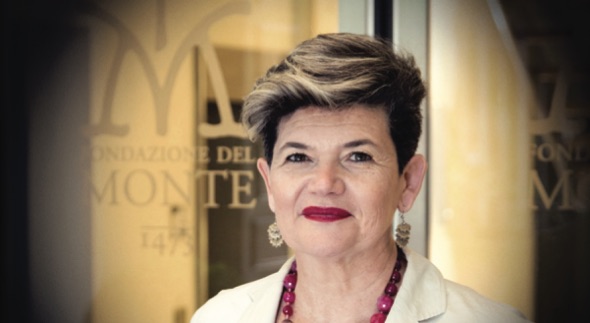In the latest issues of Vedere Oltre, a survey was initiated to identify the new needs of the sectors of society most vulnerable to the welfare crisis, exacerbated by the pandemic. Because of their own nature and institutional function, banking foundations have long played a leading role in the local contexts in which they operate. We asked Prof. Giusella Finocchiaro, President of the Fondazione del Monte di Bologna e Ravenna, professor of Internet law at the University of Bologna's Faculty of Law and lawyer specialized in new technology and privacy legislation, for her opinion on the impacts of COVID-19 on our society and economy.

President Finocchiaro, the pandemic has been affecting all of us for over a year now. Has it contributed to broadening the sectors where numerous projects submitted for funding by the Fondazione del Monte di Bologna e Ravenna or have those remained the same?
In answering this question, a general premise must be made. Our foundation, according to its statute, identifies every three years the sectors, or areas of intervention, towards which to concentrate its activities. These are aimed at social solidarity and non-profit initiatives in the field of social services and policies, the safeguarding and development of the artistic and cultural heritage of the provinces of Bologna and Ravenna and the support for the initiatives of cultural institutions operating in these areas, the contribution to scientific and technological research, as well as research aimed at maintaining and enhancing public health, and finally the development of local communities. One can easily see that the breadth of the perimeter within which the Foundation's action lies did not make it necessary to redirect or readjust anything during the emergency. Instead, we have tried to be very close to our communities, ready to address their needs and provide a timely response. Here is an example: on March 11, 2020, the Board of Directors approved a contribution of 500,000 euros for the Policlinico S. Orsola-Malpighi Hospital in Bologna and the Santa Maria delle Croci Hospital in Ravenna. The sum was used in the purchase of equipment and beds to upgrade the intensive care units. After that, and starting from the initial actions taken promptly to deal with the emergency, we focused on supporting the social vulnerabilities aggravated by the pandemic, with numerous initiatives aimed at the elderly, people with different abilities or chronic diseases and their families. In the summer of 2020, the call "What will our children and young people do this summer?" was launched, for which 150,000 euros were allocated to carry out activities aimed at children and youth with the aim of also supporting parents when they return to work after the lockdown and until schools reopen.

In light of the policies of financial restraint that Italy has been called upon to comply with for years, with the consequent decrease in resources for distribution, do you believe that the State should remain the main actor in welfare, in the provision of minimum essential services as well as in the financing of entities that make up for any structural deficiencies, especially at the local level, or should, instead, an increasingly important role be claimed by the private sector, whether non-profit organizations or for-profit entities?
Over the last few years of their history, bank foundations have been subject to different pressures. On the one hand, in the direction of a clear distancing from the contributing banks, on the other hand, with the implementation of actions to support the banking system itself but also, more generally, the country's economy at a time of emergency. Today, the role of bank foundations is to support and help the territory in which they operate, while preserving their autonomy and in full compliance with the principle of subsidiarity, in view of the reconstruction of a welfare system which is currently disrupted. It is therefore obvious that when it is not possible to face, by choice or by objective impossibility, certain problems regarding the social and economic fabric of a community, the bank foundations can and must intervene by making a system available, providing ideas and resources, involving the communities and bringing together the strengths of the territory. This is the only way to better meet the needs of individuals and families. In the experience of the Fondazione del Monte di Bologna e Ravenna, all of this takes place through proximity and connection to its territory, together with an ever-increasing ability to listen to social needs. For this reason, our foundation has taken on a new role, becoming more and more of a leader in welfare policies, with the aim of acting as a coordinator and incentive between private and public entities and evolving from a grant-making model to a participatory model, becoming an active participant in the elaboration and implementation of fundamental choices in the area. Proof of this is provided by long-running projects such as INS - Insieme nella scuola (Together in School), an initiative aimed at reducing student dropout among teenagers and promoting equal opportunities, and, in general, all educational and training interventions that combine integration and innovation, focusing attention on young people as protagonists in the creation of human and intellectual capital essential for the development and modernization of the country. I think that bank foundations are increasingly destined to strengthen this role and these aims, becoming more and more relevant in terms of their ability to promote conditions or trigger processes aimed at preventing or overcoming social inequalities.
The pandemic will continue to cause disruptive effects on the economy and society. However, is it possible to say that it will bring about positive changes, accelerating innovative processes that would otherwise take longer?
The awareness of the profound changes caused by the continuing pandemic is necessarily the starting point on which to begin any reflection on how to begin anew.
It is entirely foreseeable that it will be the cause in the medium-long term of serious economic suffering, employment problems and financial stress. The priority objective will be to tackle the already considerable economic and social inequalities caused by the 2008 crisis. The economic aftermath of the health emergency will, in fact, cause an important increase in the incidence of poverty and, in addition to the worsening of the situation of individuals and families who were already in a vulnerable situation before the emergency, there will be the problem of the loss of stable employment due to the crisis and the consequent risk of new families slipping rapidly into a situation of vulnerability. Therefore, it will be necessary to ensure a rapid and flexible response to the needs of communities by supporting initiatives that foster recovery, readjustment, and adaptation. We like to imagine that the approach to planning the next few years is to manage in an orderly way an unavoidable "navigation by sight" to respond to the needs of the territory, not focusing exclusively on strategy and systematicity, but enhancing those aspects that were fundamental in the approach to the first pandemic phase - and that in the new scenario are even more valuable - such as the ability to activate networks of collaborations and involve all stakeholders. I believe that the global crisis has once again highlighted the significant innovation and effectiveness inherent in the way we act "together with," accelerating the process of promoting support networks that impact the local fabric. The next challenge will consist in the creation of service delivery systems able to properly integrate the available public and private resources (not only at the economic level), fostering the involvement of all actors in the territories (non-profit, citizens, companies, etc.) in a perspective of openness and interaction with the dynamics of the broader context, at the national and international levels when possible.

The Fondazione del Monte di Bologna e Ravenna has supported the Istituto Cavazza with the Limitless Project, an innovative program that enables the use of digital resources to improve the autonomy of visually impaired and blind people over 65. Do you think that the support of digital resources for people with disabilities is an area of action worthy of further consideration, particularly in relation to the increasingly important issues of personal data protection?
This is one of the new challenges that have emerged in recent months: the COVID-19 crisis has emphasized the issue of social isolation for the older segment of the population, especially if they are frail or suffering from chronic diseases. This has prompted us to intervene in support of numerous projects focused on computer literacy paths, aimed at increasing digital skills, both as a support in everyday life, and as a means of distance socializing. The ultimate goal of all interventions is to put people at the centre, fostering independence in communication and supporting their social relations, ultimately bringing back to them the role that seemed to have been lost because of isolation and distancing.
President Finocchiaro, with your personal and professional experiences, you are a liaison between important sectors such as culture, education, justice, and the financial system: do you believe that Italy can take on a leading role in the "post-COVID" era?
Certainly, as long as we know how to focus on an open, supportive and innovative vision!





.png)